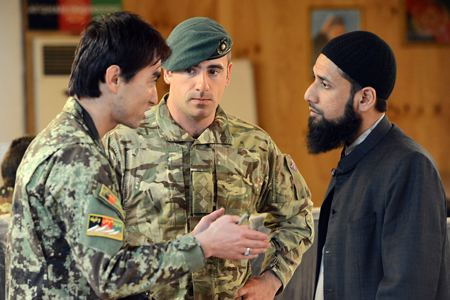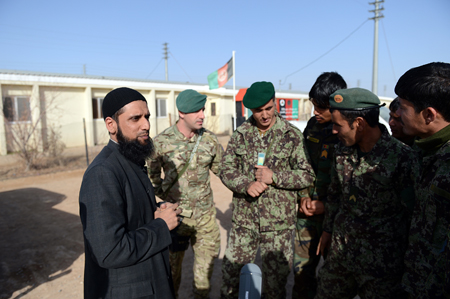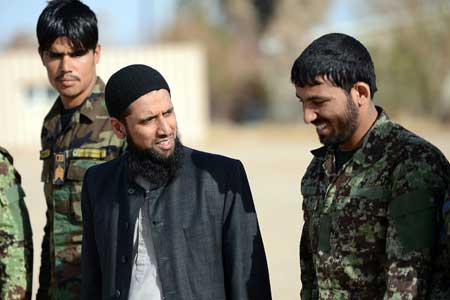
 The Islamic Religious Advisor to the Chief of Defence Staff and Service Chiefs Asim Hafiz has called for a more nuanced debate about the role of the armed forces.
The Islamic Religious Advisor to the Chief of Defence Staff and Service Chiefs Asim Hafiz has called for a more nuanced debate about the role of the armed forces.
In a wide-ranging and exclusive interview for the Religious Reader, Hafiz was critical of those in Muslim and non-Muslim communities who see the army as a singular ‘killing machine’.
For Hafiz, the opposite is true: “[The armed forces] brings out a sense of responsibility and spirituality you might not see in the general public. They see issues like life and death far more clearly than those on the street. So I always say to people that soldiers are the best humanitarians I’ve met.
Again, people might be confused, but primarily their role is to their country, provide peace and security.”
The transition from prison to armed forces chaplaincy was not always easy, but he has no regrets: “In 2005, I was appointed as the first Muslim chaplain to the armed forces. At that time, I was a chaplain in the prison service and I saw the post advertised and thought it would be a very interesting and important role.
The war in Iraq was at its peak, Afghanistan was beginning to pick up again. The War on Terror was on everyone’s mind and I thought what better place to be engaged as a Muslim,” Hafiz said.
But the career change did not meet universal approval, as some reacted with confusion: “Not everyone patted me on the back and said ‘Yes, Asim, this is something you should do’ – there were some challenges. People did not understand what my role was going to be about. My peers were worried about me going to work for the armed forces.”
There was an ignorance about what the armed forces do and my argument to them was ‘I’m not joining the armed forces to condemn or condone war.
That’s not necessarily my job. Just because someone joins the armed forces, does not mean, they are less human. They still have families, children, they have hobbies and some are religious, and they need that support.’”
Hafiz wanted to help his fellow Muslim in the armed forces (a number that now stands at approximately 650), with pastoral care, spiritual and religious guidance. The importance of the latter proved vital, as Muslims now receive guidance within the institution, rather than say, at a mosque, with individuals unaware of the context of their job.
The advice given could of a religious and non-religious nature, as Hafiz explained: “Sometimes soldiers will come to me for a variety of reasons. It can be as simple as what time do I pray? Or something more complicated – Can I keep a beard while I’m in the army? Can I fast and be on operations at the same time? Or do I choose between the two? Or it might be family or financial problems. Or issues with the chain of command.”


Every year, Muslims within the armed forces attend a spiritual and moral development course, which looks at a range of topics from an Islamic perspective.
Hafiz found many soldiers had doubts about the morality of killing: “The ‘trigger happy’ perception of British soldiers (and soldiers in general) is not true. It was a bit of a culture shock for me when I’m from the civilian community and you see images of soldiers firing artillery, shooting guns, or blowing things up on television.
But you realise that there is a really strong human side to the soldier. The idea that you’re worried about pulling the trigger and making the right choice was immensely powerful for me.”
By 2010, Asim found his services extending towards an advisory role once the chain of command recognised the unique position an imam offers in terms of religious and cultural knowledge.
Deployment to Afghanistan meant he could also dialogue with individuals about the diversity of Islam in Britain.
The manipulation of a person’s religious sentiment might create conflict. But faith also offers a message of hope, conciliation and peace, and it was within the nuances of this debate that Asim recalled praise from high command: ‘You are really important to me – because the armed forces are not only about fighting wars. They are also about preventing wars.’ I thought that statement was very powerful.”
In 2014, Hafiz received an OBE for his services to defence: “It was very honouring, and nice to be recognised, especially when I had been away from my family doing all this work. It was the responsiveness of the commanders of what I had to offer that really allowed me to achieve what I was able to do. It was teamwork. If people did not respond to me then I would not be able to do what I did. That’s why we were able to make some progress, a little progress, but it’s the small steps that become giant steps,” he said.
Muslims within the armed forces can inspire others who feel disconnected from British society, as Hafiz made clear:
“I do think Muslims in the armed forces can be role models for young Muslims because they are Muslim, British and say they are willing to die for their country, and I’m a soldier.
I do not see incompatibility of what makes me who I am and I think that’s a very powerful thing to project to individuals who might be vulnerable and who might be going through an identity crisis. Or a quest to figure out where they might belong.
That can potentially really help people learn what the soldier is and also understand that just because you join the military does not mean you lose your faith. The military is like a cross section of society – I’ve met very religious people in the armed forces – like I have on the street in terms of the spectrum of practise and belief.”
In terms of employment, Hafiz pointed out that there is no ‘singular’ career path within the armed forces: “We offer a variety of trades – so in the army it is not just a combat role. We need to be able to project and show people what the armed forces are really about. Then let them make them choice.”
With time, Hafiz expects to see more British Muslims join an armed forces that is making greater efforts to engage faith communities.